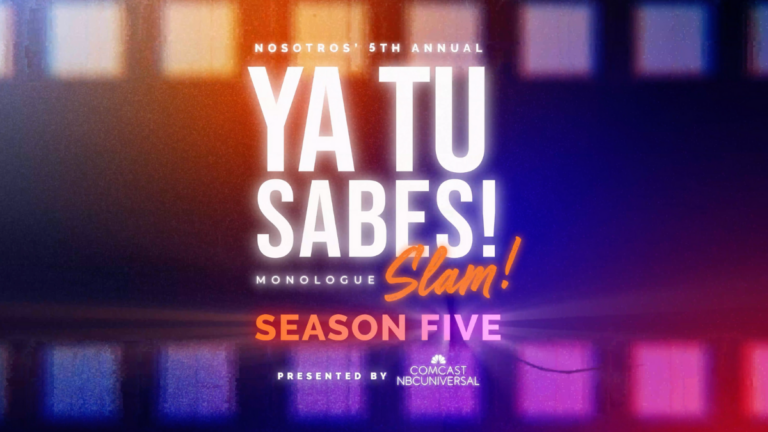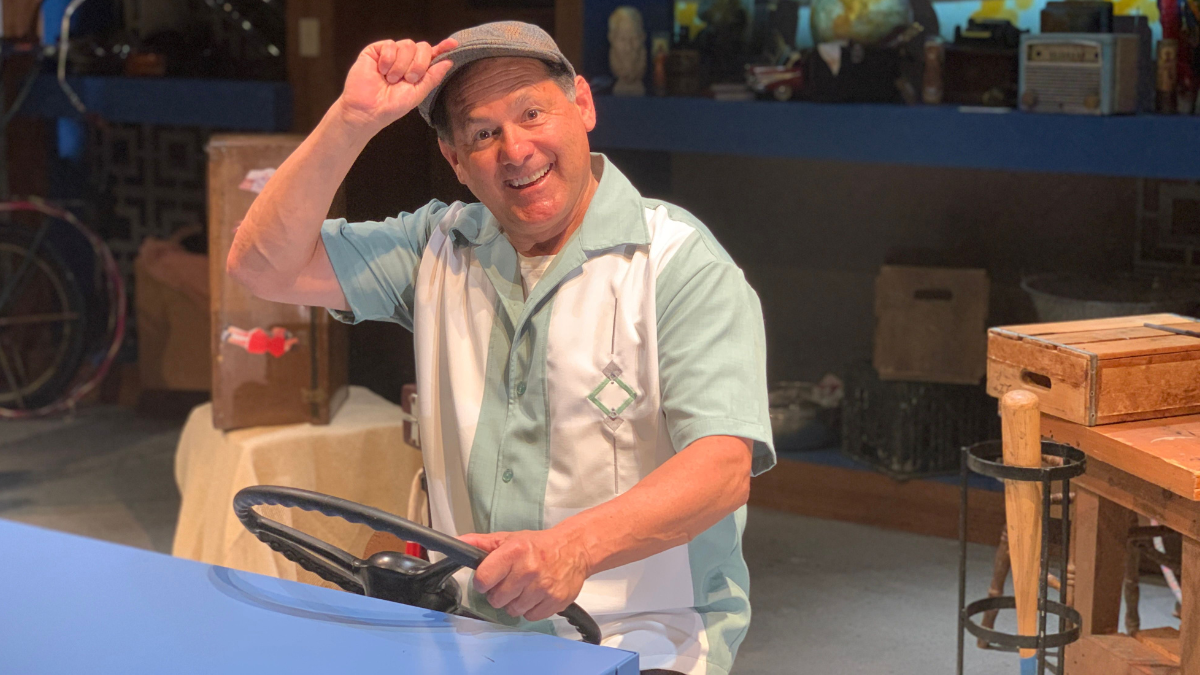
A one-on-one interview with Ric Salinas, star of the one-man comedy, ‘57 Chevy.
By Cris Franco
For one night only, on Sunday, September 11th, 2022 Ric Salinas (of Culture Clash fame) will revive his much-;auded solo performance in Cris Franco’s acclaimed comedy ’57 Chevy. This uproarious look at the playwright’s immigrant family’s misadventures will be performed as part of A Place Called Home’s El Centro del Sur’s Latinx Theater Festival.
We caught Salinas between rehearsals as he prepared to once again take on the daunting task of delivering the 10,000-word, joke-packed monologue where he portrays some 32 different characters in this 72-minute hit that the Los Angeles Times called, “A hilarious trek!” Here’s what Salinas had to say.
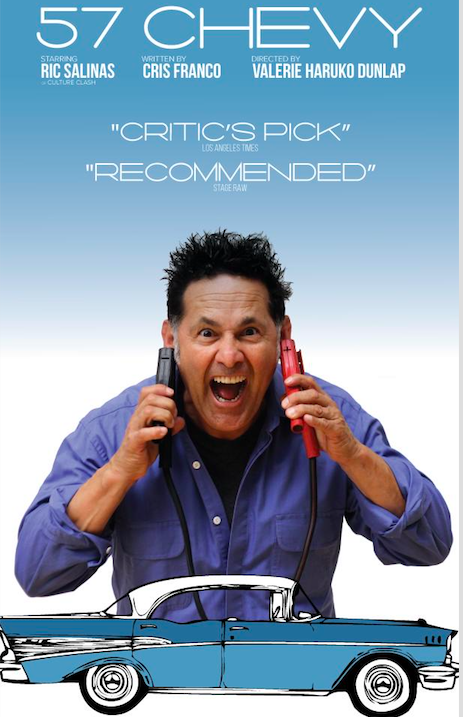
LATINHEAT (LH):
Your work in ’57 Chevy earned you glowing reviews like “comic genius,” “tour de force,” and “magnetic!” How would you describe your performance?
RICK SALINAS (RS):
It’s a wish come true for a clown like me. Since grade school I have always been the “class clown” – my poor teachers. I would not stop talking! I grew up watching reruns of the Marx Brothers, Laurel and Hardy, Abbot & Costello, Lewis & Martin and Lucille Ball in I love Lucy. I wanted to be all of them. I studied these comic geniuses and got lucky when I joined LatinX Theater/Teatro’s premier comedy troupe: Culture Clash. We employ all comedic styles in our work and my performance in ‘57 Chevy allows me to perform all the genres I love doing: physical comedy, stand-up, impressions, character work, clowning. So, to answer your question, I’d describe my performance as someone doing something that they’ve been preparing for all their life. I just adore doing it!
LH:
And audiences adore watching you. What’s so very thrilling is seeing you morph into the various characters: the narrator “Junior” as a child, pre-teen, and adult – and also all his family (male and female), friends, neighbors and extended relatives both in the U.S. and his native Mexico. How does an actor prepare for something as demanding as ’57 Chevy?
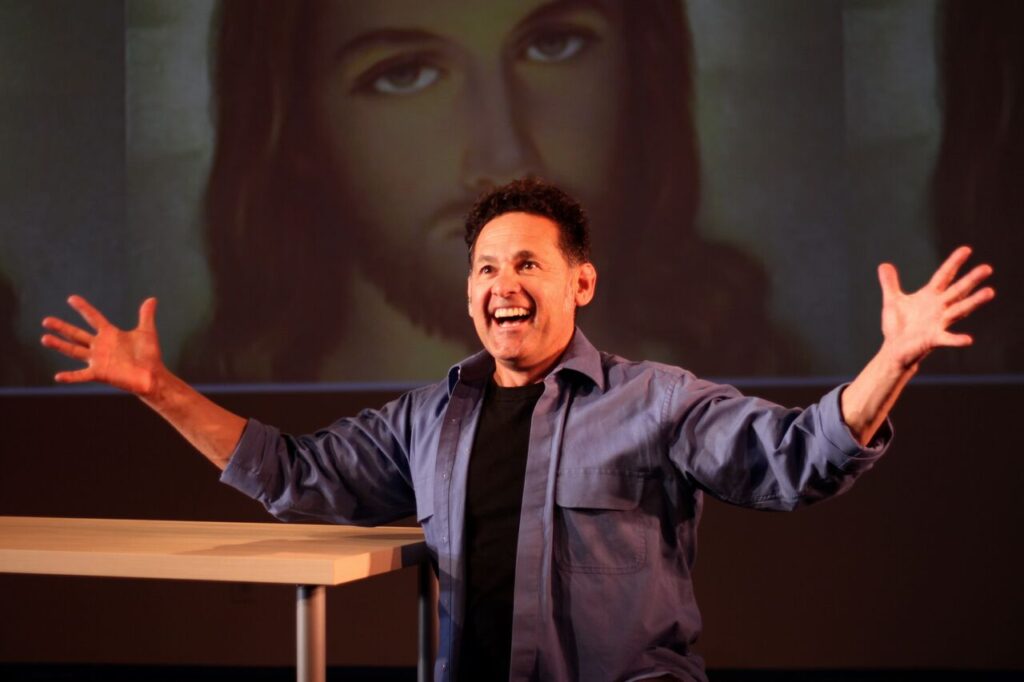
RS:
Okay. My process is this: on a show day, as soon as I wake up, I begin focusing on the show. I start the day going over my lines, knowing that I have to perform. In a sense, I Zen out and avoid talking to anybody. I’m in my own vibe. My own orbit. That’s how I get into to it. And when the show starts, I see a green light in my head. Time to go. I feel as though I’m at the foot of the Himalayas preparing to scale my way to the top. So how tall are they – like 30,000 feet or whatever? I take it step-by-step. First I hit this mark, then the next until I see the top of the mountain and then I sprint all the way up to the zenith. That’s how I do it.
LH:
You make it sound so simple. But performers know it’s a titanic effort. What’s the best thing about performing in a one-man show?
RS:
The best thing about performing a one man show is that if I’m upset at the cast I only have to look in the mirror! A solo artist can only depend on themselves. I am in charge of hitting all the show’s elements: blocking, acting, differentiating character and voices – simply put I’m in charge of all the “playing.” Acting is pretending. In ’57 Chevy I pretend I’m a border guard, a nun, a chola, a cantinero, a boy, his Old-World Mexican dad and everyone in their world. That’s the best thing about being a in ’57 Chevy, it’s a play where I get to play. And if I get mad at the cast it’s getting mad at myself!
LH:
What’s the worst thing about performing in a one-man show?
RS:
It does get a bit lonely backstage. Before the show, I’m in the dressing room all alone. Just me and my reflection in the dressing room mirrors. I arrive at the venue with my suitcase, my wardrobe, my make-up, my script all by my lonesome. I don’t have any other cast members to share my excitement or nerves or pump me up for the performance. I have to do that all by myself. So, it’s a very intense, personal experience. Sort of an artistic gauntlet every solo performer goes through before you get to share yourself with your audience. Until I hit the stage, it’s like that old 70s hit – I’m “Alone Again Naturally.”
LH:
You said that what attracted to you ’57 Chevy was the honest depiction of the immigrant experience.
RS:
Yes, although I’m a Salvadorian I could totally relate to Cris’ family’s adventures in immigration and acculturation. Audiences howl with laughter because they, too, can relate to parents who covered their living room furniture in plastic, a strict Dad not letting their teenage girls go to American “piyama parties,” everyone’s Mom’s hybrid Spanglish (saying “baby-city” for “baby-sitter”) and squeezing lots of children into a tiny tract house all under the watchful stare of ‘Stalker Gringo Jesus’ – that picture of a blonde-haired, blue-eyed Jesus with the eyes that follow you around. That’s what ’57 Chevy is about – that shared Mexican-Salvadorian-Honduran-Cuban-Chicano-Puerto-Rican-Domominican-immigrant experience.
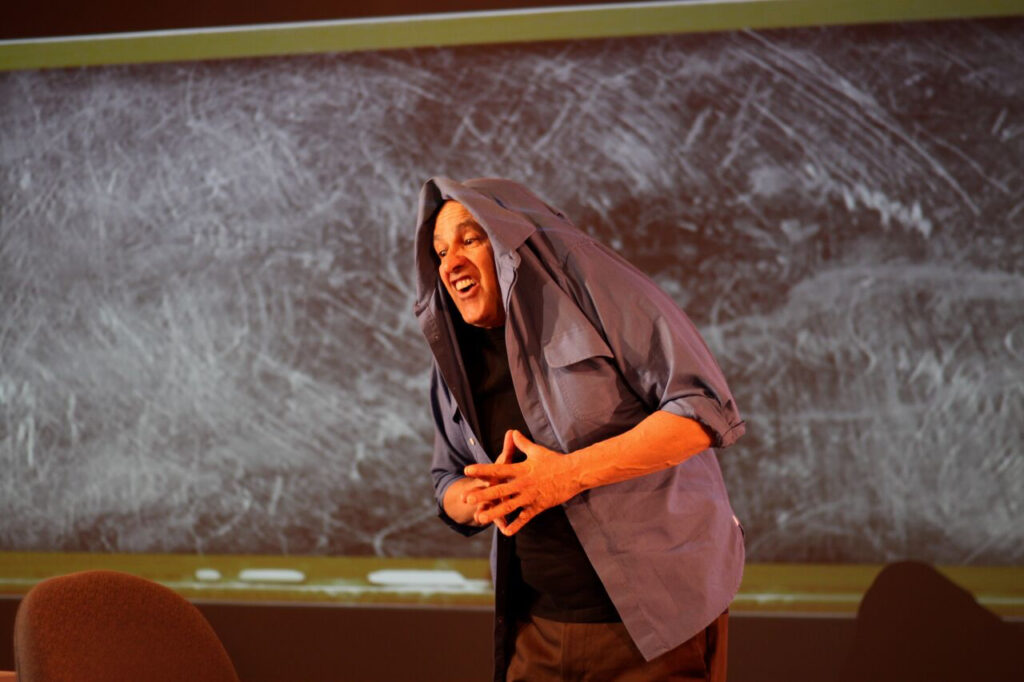
LH:
Speaking of our pan-LatinX communities. How do you feel about performing at A Place Called Home?
RS:
A Place Called Home is a non-profit that is investing in its youth and especially in the arts, media, visual, theater, sound, video, all the things that as a young person of color sometimes doesn’t get that opportunity to delve into these important creative outlets. I never had this opportunity as a youth, so that is why I feel so good about working with them and demonstrating it by doing my performance of ‘57 Chevy in this fantastic LatinX theater festival.
LH:
It’s a whole weekend of plays. You’ve said that although you’ve done decades of political teatro with Culture Clash – you feel that ’57 Chevy might be your most political work to date. Why?
RS:
Because this play is focused on a father, a son, their family and their car. And as seemingly light and unassuming as ‘57 Chevy is, it’s powerful because it normalizes we Latinos. It sets us squarely into the heartland of American folklore: the U.S. in the mid-century. A time when the U.S.A. was at its mightiest and the concept of the typical American household was being defined via film and television. This is a sacred era held dearly by the American psyche. ’57 Chevy places Mexicans into that homespun setting which, until now, has been reserved for the waspiest of wasps; in effect saying that being LatinX in America is as normal as mom’s tamale pie.
And a delicious slice of tamale pie at that! To enjoy Salinas’ spellbinding performance, attend A Place Called Home’s El Centro del Sur’s Latinx Theater Festival which is presenting three different plays on three nights: Black Butterfly, Jaguar Girl, Piñata Woman and Other Superhero Girls, Like Me (Fri. 9/9 @ 8pm)presented by LAMusArt; Lolo presented by Company of Angels (Sat., 9/10 @ 8pm); ’57 Chevy(Sun. 9/11 @ 6pm). All productions are family-friendly, FREE and are followed by a Q&A. For tickets, you must reserve at: www.apch.org/elcentrodelsur

